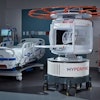Sunday, November 27 | 11:25 a.m.-11:35 a.m. | SSA22-05 | Room S405AB
German researchers will explain in this scientific presentation how machine-learning technology can handle the challenge of assessing the image quality of MR studies.Automated analysis of medical imaging data is becoming increasingly important. In large epidemiological imaging studies such as the U.K. Biobank MR study or the German National Cohort MR study, for example, thousands of participants are being examined with whole-body MRI, said lead author Dr. Sergios Gatidis of the University Hospital Tübingen in Germany.
"It is nearly impossible to analyze all of these datasets manually," he said. "Thus, automated processing is necessary."
To ensure data validity in these studies, it's important to identify low-quality images that may produce false results due to measurement errors and artifacts, he said.
"This assessment of image quality should be performed automatically," Gatidis told AuntMinnie.com. "Another possible application of automated MR image quality assessment is providing direct feedback to the examiner about a current clinical MR study, thus enabling adjustment of protocols and parameters to ensure good image quality."
The group is using machine-learning techniques to provide automatic assessment of MR image quality.
"In short, a machine-learning algorithm is presented with MR images of different quality, and learns which image features are useful to assess different levels of image quality," he said.
How well did the method perform in automatically classifying quality on MR images? Attend this Sunday morning presentation to find out.



.fFmgij6Hin.png?auto=compress%2Cformat&fit=crop&h=100&q=70&w=100)





.fFmgij6Hin.png?auto=compress%2Cformat&fit=crop&h=167&q=70&w=250)











